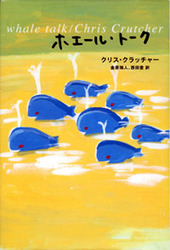- Home
- Contact
- Biography
- NCTE/ALAN 2013 Q&As
- Author Visits
-
Crutcher Books
- Other CC Books
- For Educators
- Angus -- The Movie
- Older News Briefs
- Photo Albums
- Scrapbook
- CC Videos
- Student Projects
- Censorship
- Banned Book Videos
- Teens CAN Stop Censors
- Banned Books Week
- Extras!
- CC Press
- Letters to CC
- Movie News
-
Crutcher Speeks
- Update Bantleman/Tjiong
- Nod to Gnuts
- Hip-Hop
- Good Day...
- Gun Referendum
- Free Neil and Ferdi >
- Responsi-damn-bility
- Whacking on Your Children >
- Piling On
- Biopsy Biography
- Walter Elevated Us All
- Different Direction
- Parenting Guidance
- Goodbye, Ned.
- Happy Birthday, Crutch!
- Forrest Bird Charter School
- Senator Portman
- My Gun Rant
- Maybe Now (Guns & Mental Health)
- Support Your Local Pragmatist
- So You Want to Be a Righter
- Philosophy and Humanity
- We Are Paterno
- Boy Scout "Leadership"
- Thoughts on McQueary
- To Meghan Cox Gurdon/WSJ
- India 2011
- Crutcher-Price Blog
On Turning Japanese -- WHALE TALK, that is!
When traffic from a Japanese website started to hit Chris’s website, we decided to return the favor. At the other end of the link was Tokyo University Professor Mizuhito Kanahara’s website (http://www.kanehara.jp/staffosusume/) in Japanese. Though most of the characters were beyond our comprehension, we did recognize scattered words in English -- Chris Crutcher's name and book titles, to be precise.
Curious, we wrote to the webmaster -- hoping his English was better than our Japanese -- and asked about the traffic and what seemed to be a new WHALE TALK book cover. To our great surprise and delight, he offered this response:
Hello,
Thank you for the e-mail. It is the Japanese cover of Whale Talk by Chris Crutcher. Of course! I hope you found seven whales. They are the seven boys in the novel.
I am a professor of a university in Tokyo and translator. I have translated over 180 books. Whale Talk is one of the best books of them. I really cried two or three times, when translating it. It is so moving!
Have a wonderful day.
Mizuhito Kanehara
Fascinated, we wanted to know more, and Mizuhito was kind enough to answer a few questions, as featured below. Thank you so much Mizuhito, for responding to our emails and for working so hard to bring this story to Japanese readers. Here's hoping you'll soon have other Chris Crutcher books to translate.
QUESTION: Had you read any other Chris Crutcher books before you translated
WHALE TALK?
Mizuhito Kanehara: Yes, STOTAN!, IRONMAN and his ILL-ADVISED AUTOBIOGRAPHY. I loved KING.
QUESTION: Do Chris's books translate well into Japanese? Do Japanese readers like them?
Mizuhito Kanehara: WHALE TALK is the first translation of his. I have had very favorable comments from critics and readers. I hope it will be read as a modern classic in Japan. By the way Spokane is a familiar name for me, because I translated some of Sherman Alexie's books.
QUESTION: Were there any special challenges in translating this book? Any elements that were harder to translate than others?
Mizuhito Kanehara: In reality, it was very hard for me to translate the book. It is full of slang used by American young people and TJ's ironical comments are sometimes too clever to understand. MY co-translator Noboru Nishida roughly translated [the slang] and I checked the translation. Two more people checked it and Karen, one of my colleagues at the university, helped me so much! Of course she loves the story, too.
QUESTION: Do you have any thoughts on the book cover differences?
Mitzuhito Kanehara: I noticed an interesting fact between Japanese books and American ones. As you know the jackets of several books by Chris Crutcher are photographs. I think American publishers like to use photographs for jackets of young adult books. That is rare in Japan.
QUESTION: You said in your note that the book moved you. What did you like about WHALE TALK?
Mizuhito Kanehara: It is full of strength just like a tornado. It takes you up into the sky by force and spins you so hard. You can do nothing else once you begin reading it. I had the same feeling when I translated A DAY NO PIGS WOULD DIE by Richard Newton Peck, BLESS ME ULTIMA by Rudolfo Anaya and HEAVEN'S EYES by David Almond.
QUESTION: How are Japanese young people different from the teens in Chris's books?
Mizuhito Kanehara: The situation of Japanese young people and American ones is rather different but I think Japanese young people are essentially the same. I hope many of them will enjoy WHALE TALK.
Curious, we wrote to the webmaster -- hoping his English was better than our Japanese -- and asked about the traffic and what seemed to be a new WHALE TALK book cover. To our great surprise and delight, he offered this response:
Hello,
Thank you for the e-mail. It is the Japanese cover of Whale Talk by Chris Crutcher. Of course! I hope you found seven whales. They are the seven boys in the novel.
I am a professor of a university in Tokyo and translator. I have translated over 180 books. Whale Talk is one of the best books of them. I really cried two or three times, when translating it. It is so moving!
Have a wonderful day.
Mizuhito Kanehara
Fascinated, we wanted to know more, and Mizuhito was kind enough to answer a few questions, as featured below. Thank you so much Mizuhito, for responding to our emails and for working so hard to bring this story to Japanese readers. Here's hoping you'll soon have other Chris Crutcher books to translate.
QUESTION: Had you read any other Chris Crutcher books before you translated
WHALE TALK?
Mizuhito Kanehara: Yes, STOTAN!, IRONMAN and his ILL-ADVISED AUTOBIOGRAPHY. I loved KING.
QUESTION: Do Chris's books translate well into Japanese? Do Japanese readers like them?
Mizuhito Kanehara: WHALE TALK is the first translation of his. I have had very favorable comments from critics and readers. I hope it will be read as a modern classic in Japan. By the way Spokane is a familiar name for me, because I translated some of Sherman Alexie's books.
QUESTION: Were there any special challenges in translating this book? Any elements that were harder to translate than others?
Mizuhito Kanehara: In reality, it was very hard for me to translate the book. It is full of slang used by American young people and TJ's ironical comments are sometimes too clever to understand. MY co-translator Noboru Nishida roughly translated [the slang] and I checked the translation. Two more people checked it and Karen, one of my colleagues at the university, helped me so much! Of course she loves the story, too.
QUESTION: Do you have any thoughts on the book cover differences?
Mitzuhito Kanehara: I noticed an interesting fact between Japanese books and American ones. As you know the jackets of several books by Chris Crutcher are photographs. I think American publishers like to use photographs for jackets of young adult books. That is rare in Japan.
QUESTION: You said in your note that the book moved you. What did you like about WHALE TALK?
Mizuhito Kanehara: It is full of strength just like a tornado. It takes you up into the sky by force and spins you so hard. You can do nothing else once you begin reading it. I had the same feeling when I translated A DAY NO PIGS WOULD DIE by Richard Newton Peck, BLESS ME ULTIMA by Rudolfo Anaya and HEAVEN'S EYES by David Almond.
QUESTION: How are Japanese young people different from the teens in Chris's books?
Mizuhito Kanehara: The situation of Japanese young people and American ones is rather different but I think Japanese young people are essentially the same. I hope many of them will enjoy WHALE TALK.
- Home
- Contact
- Biography
- NCTE/ALAN 2013 Q&As
- Author Visits
-
Crutcher Books
- Other CC Books
- For Educators
- Angus -- The Movie
- Older News Briefs
- Photo Albums
- Scrapbook
- CC Videos
- Student Projects
- Censorship
- Banned Book Videos
- Teens CAN Stop Censors
- Banned Books Week
- Extras!
- CC Press
- Letters to CC
- Movie News
-
Crutcher Speeks
- Update Bantleman/Tjiong
- Nod to Gnuts
- Hip-Hop
- Good Day...
- Gun Referendum
- Free Neil and Ferdi >
- Responsi-damn-bility
- Whacking on Your Children >
- Piling On
- Biopsy Biography
- Walter Elevated Us All
- Different Direction
- Parenting Guidance
- Goodbye, Ned.
- Happy Birthday, Crutch!
- Forrest Bird Charter School
- Senator Portman
- My Gun Rant
- Maybe Now (Guns & Mental Health)
- Support Your Local Pragmatist
- So You Want to Be a Righter
- Philosophy and Humanity
- We Are Paterno
- Boy Scout "Leadership"
- Thoughts on McQueary
- To Meghan Cox Gurdon/WSJ
- India 2011
- Crutcher-Price Blog


